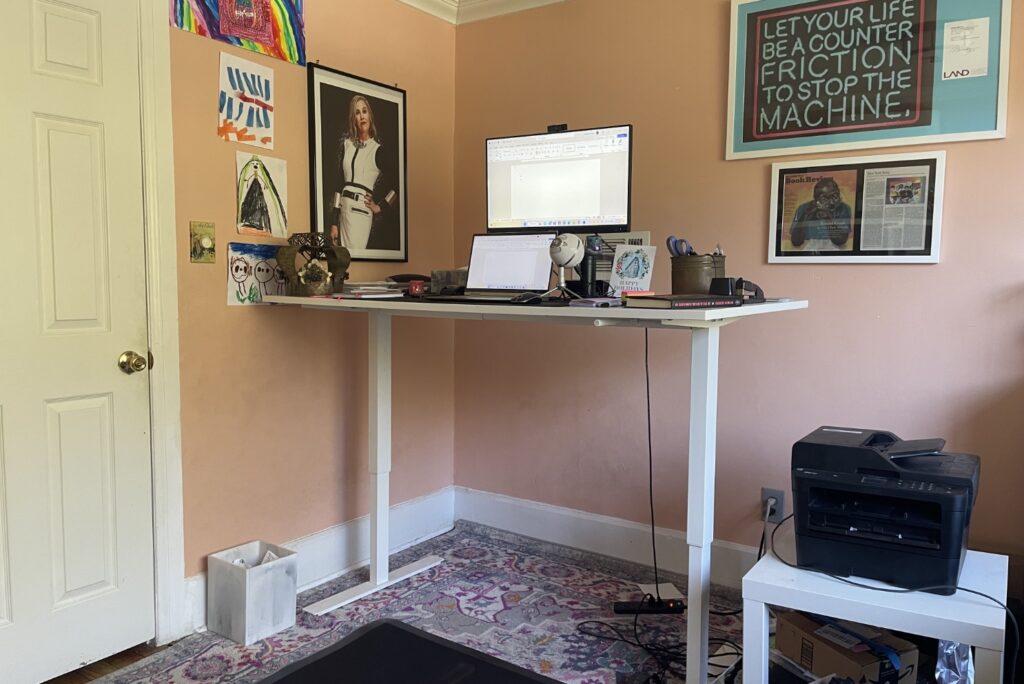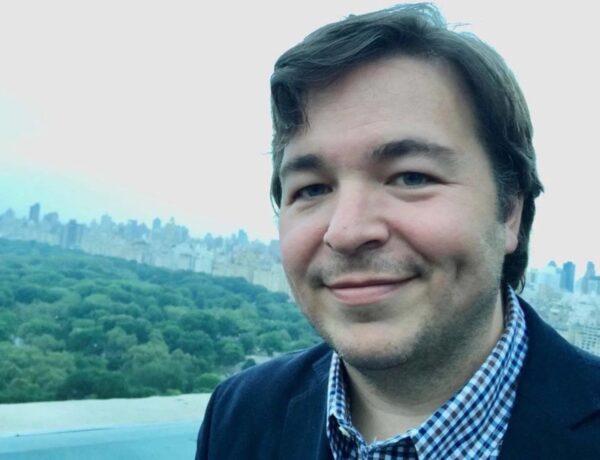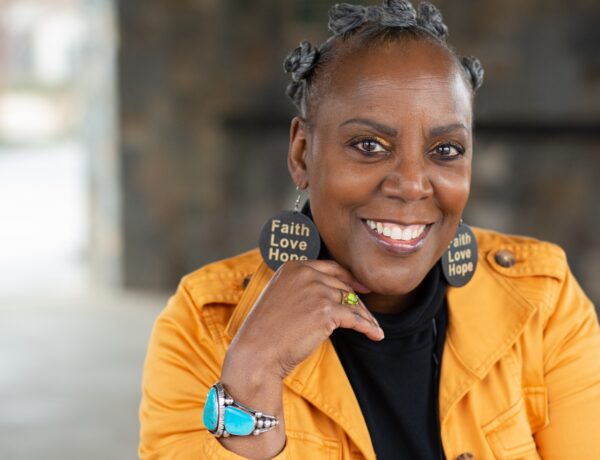Rasheed Newson is a writer and television producer from Indianapolis, Indiana. Growing up as the eldest of three children, he developed a love for poetry and fiction, with Nikki Giovanni and Kurt Vonnegut among his favorite writers.
Despite this early interest, it took Rasheed years to consider himself a writer. After attending a Jesuit high school, Rasheed moved to Washington, D.C. to attend Georgetown University where he wrote movie reviews for the school newspaper.
He also worked in communication and media for several non-profit organizations, including the Coalition for Juvenile Justice and Grandma’s House, a group home for foster care children living with HIV/AIDS. In 2002, he moved to Los Angeles and began his career in the entertainment industry, working as a production assistant and executive assistant for various studios and shows.
He eventually partnered with T.J. Brady, and together they have worked as staff writers on various drama series, currently serving as executive producers and showrunners of Bel-Air. In addition to his television work, Rasheed is also the author of the novel My Government Means to Kill Me, a passion project that was picked up by literary agent Jim McCarthy and publisher Nadxieli Nieto of Flatiron Books. Rasheed currently lives in Pasadena, California with his husband and their two children.
Looking for inspiration to help you achieve your writing goals? Subscribe to our newsletter for exclusive insights into the routines, habits, and techniques of some of the most celebrated authors in history.
Hey Rasheed, great to have here today with us. Can you tell us about your journey to becoming a writer, and how your background in Indiana and your experiences with the LGBTQ+ community have influenced your work?
I knew I wanted to be a writer when I was young, but I didn’t share that dream with anyone while growing up in Indiana. No one in my family – hell, no one in my community – knew anyone who made a living as a screenwriter or as an author. In some ways, it was easier coming out as gay than it was professing my desire to be a writer. People could see that I had a future in being gay.
I moved to Los Angeles after college, and I spent the next seven years working at just about every major studio as a temp or an executive assistant. On my off-hours, I wrote film scripts that never had a prayer of getting bought. Eventually, I met TJ Brady in a writers group, and we became friends and television writing partners. Together, we landed our first job as staff writers on the drama series Lie to Me.
When I told my mother that I was quitting my job as an assistant to become a professional writer, she asked me, “If the show gets cancelled, can you get your old job back?” There is a bedrock Midwestern disbelief that writing is a viable profession, and I carry some of that. Fortunately, my disbelief turns into awe and joy. I’m perpetually amazed that I get to write for a living.
My work tends to examine stories from an outsider’s point of view. I like to question the assumptions and values of the dominant class, and I am not eager to adopt their ways. I believe there is beauty and currency in how marginalized groups thrive. I want to be met on my own terms. All of that resilience, sass, and creativity were instilled in me as a member of the LGBTQ+ community.
How did your time working in the entertainment industry shape your writing process and style?
Writing for drama series (such as Bel-Air; The Chi; Narcos; and The 100) trains you to hit deadlines. We can’t tell the studio and network executives or the cast and crew that the latest script isn’t ready because of writer’s block. So I write as a matter of discipline, and I trust in my talent. My first draft will be good, and my revisions will make it better and better.
TV also teaches you how to outline and re-outline quickly under considerable pressure. To look at it through a financial lens, our scripts are the blueprints for what are $100-million enterprises (shows like House of the Dragon cost considerably more). Every series has a tight production schedule, a merciless post-production timeline, and immovable airdates.
We outline our episodes scene by scene and act by act. Yet, with little to no notice, storylines can get axed by the studio, a key location can become unavailable, or actors can suffer mishaps that prevent them from performing as you imagined. In those instances, you have to pivot, and you might have less than a day to reconsider your changes and how they will ripple through the rest of the episode or season.
The good news is that the deadlines and instant restructuring become second nature. I’ve written for television for nearly 15 years. I’ve worked on hundreds of episodes. I believe in creative muscle memory that reminds you that you’ve done something like this before and you found a way through it. You will again. You just have to get on with it. That’s my writing process in a nutshell: get on with it.
Can you speak to the themes and messages in your debut novel My Government Means to Kill Me and the process of bringing it to publication?
My Government Means to Kill Me is about a Black, gay young man’s sexual and political awakening in New York City during the 1980s. I wanted to tap into the hypnotic time that most of us experience in our late teens and early 20s when the freedom of adulthood is fresh, sex feels like a vibrant delight, and political idealism runs high. This is a historical novel about self-discover, the bonds of friendship, and the need to address the political struggles of your time. Oh, and the book has plenty of laughs because humor is my defense mechanism.
The novel’s journey to publication met with a big challenge coming out of the starting gate. My lit agent read the manuscript and dropped me as a client. She didn’t see the appeal. Fortunately, my husband convinced me to pursue another lit agent from a list of agents that he pulled together by seeing who represented other writers who published novels like mine. (I married very well.)
Now I’m happily represented by Jim McCarthy at Dystel, Goderich & Bourret. After a targeted and quick submission process, Nadxieli Nieto at Flatiron bought the manuscript and became my editor. Working with Jim and Nadxi made the novel sharper, and the publication process has been glorious.
Discover the daily writing habits of authors like Stephen King, Neil Gaiman, and Gillian Flynn with Famous Writing Routines Vol. 1 and learn how to take your writing to the next level. Grab your copy today!
What does a typical writing day look like for you?
This is my schedule when I don’t have a show in production and I’m working on a book. The writing day doesn’t begin for me until I’ve gotten my two kids (ages 8 and 5) up, dressed, fed and off to school. I find the hour from 9am to 10am is quiet in Los Angeles because the workday in Hollywood doesn’t really start until 10am.
After the quiet hour, I try to write through the morning, but I answer calls from my writing partner, TJ Brady; my agent at UTA, James Kearney; creative executives; other television writers; and my mother. In the afternoon, I break for lunch. I go to the gym if I’m good. Then I tend to read scripts, articles of interest, and books for pleasure. There might be another hour of writing before I pick my kids up. If I’m feeling inspired or under deadline pressure, I can write in bed at night for another couple of hours.
My writing flow depends on knowing what I’m going to write before I touch the keyboard. So ideally, there are breaks in the day that allow me to figure out where I’m going next.
How do you balance your responsibilities as a showrunner and your work on passion projects like your novel?
How to explain madness? When I am showrunning and working on a book at the same time, I am scheduled within an inch of my life. Every hour is accounted for, and the day starts at 5:30am. If I’m not under a production deadline, this is when I try to work on the novel before my kids wake up at 7am. I lean on my husband, Jonathan, and my writing partner, TJ, to do my job without disappearing from my family life.
So I either spend the morning with my children before school or I have dinner with my family. I don’t usually get to do both during the work week. On any given day, I might spend hours on set, or running the writers’ room, or on notes calls with executives, or writing/revising scripts. It’s a long day. I usually write into the night. I try to go to bed by 2am, but I have written through the night at least a dozen times a season.
I don’t mean to romanticize working around the clock. It is dreadful and unhealthy. The season always begins manageably and ends with weeks of exhaustion. And I split my duties with a writing partner/co-showrunner. I wish the television schedule was less punishing.
Can you talk about your experience working as a writing team and the dynamics of collaboration in your work?
I don’t think I could survive as a TV writer/producer/showrunner without TJ. We’ve spent our entire television career as writing partners. We are like brothers, and we look after each other at work and in life.
As collaborators, we are on the same wavelength 99% of the time. This allows us to split our duties with confidence that we can make decisions that the other one will agree with. TJ and I also keep each other grounded and crack each other up even when no one else is laughing.
Our dynamic is a classic older brother (TJ)/younger brother (me) vibe. TJ is more likely to have a stronger sense of direction and ambition. He can be quite protective of me, and he is typically more serious than I am. I am usually more playful and less conventional. We balance each other naturally.
Can you discuss your volunteer work with children in foster care, and how it has influenced your writing for television and for your novel?
While I lived in Washington, D.C., I volunteered for five years as an assistant caretaker to children in Grandma’s House, a group foster care facility for kids who were HIV+. I helped the kids with homework, played games with them, served dinner, and corralled the kids at bedtime.
I think the kids liked me because I could toss them into the air and catch them, and I’d climb the fence when the football went over it into the alley. I was 18-years-old when I started volunteering there; I was an adult that they knew would let them get away with talking back and bending the rules ever so often. During my time there, I got to meet a few dozen kids. I loved them.
The experience changed my life profoundly. It was volunteering at Grandma’s House when I realized that I wanted to be a parent when I was older. It also proved to me that I could love a child without a biological connection. You raise them; you love them; they are yours; and you are theirs. My husband and I adopted our two children.
As for my writing, the experience certainly shaped how I wrote My Government Means to Kill Me. I wanted my main character to have an experience with direct service. The kind of volunteer work where you see the faces of people in need. It’s the type of work that those who advocate on a policy level might become disconnected from. I think the whole experience taught me to cherish small moments and tiny victories.
What does your writing workspace look like?
Because of COVID, Bel-Air’s writers’ room met by Zoom for seasons 1 and 2. So I work in the upstairs office in my house at a standing desk. My desk is large and cluttered—but organized. I have a view of the trees and the street in front of my house. I have some artwork by my children and by Patrick Martinez on my walls. Also the New York Times review (spoiler alert: it’s a rave) of My Government Means to Kill Me is hung with care. I want to be able to look up and see things that make me smile.

Affiliate disclaimer: Some links on this website are affiliate links. We may earn a small commission if you make a purchase through these links, but only promote products we truly believe in. We disclose affiliate links and give honest reviews.



No Comments